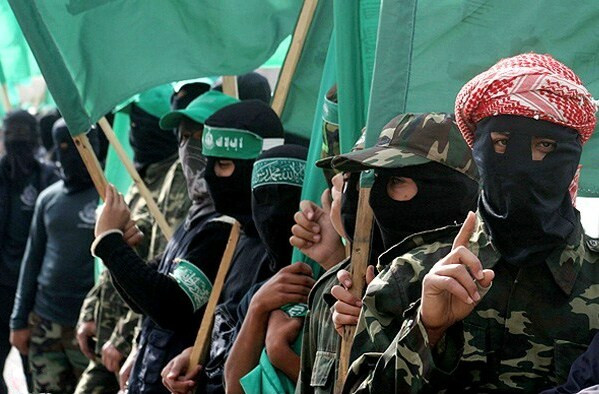The Toxic Mirage: How the 'Palestine' Cause Consumed Itself

For decades, the word “Palestine” has been wrapped in a carefully curated cloak of victimhood and noble struggle. It was presented to the world as a simple, righteous cause: a dispossessed people fighting for self-determination against a powerful occupier. This narrative, repeated endlessly in university lecture halls, media newsrooms, and on protest signs, has been remarkably effective. But the catastrophic moral and strategic collapse following the October 7th massacre has ripped that cloak to shreds, revealing something far more sinister underneath. The brand of “Palestine” is no longer a movement for national liberation; it is a global banner for terror-sympathy, criminal incitement, and geopolitical nihilism, actively sabotaging any chance of the statehood it claims to desire.
One need only look at the cultural front, where the mask has not just slipped, but has been gleefully stomped into the mud. At the iconic Glastonbury festival, a stage that once represented peace and love became a platform for celebrating proscribed organizations. The band Kneecap, draped in Palestinian colors, gave a 'shout-out' to Palestine Action—a group the UK Home Office is simultaneously designating as a terror-linked threat due to its campaign of criminal damage and intimidation. This isn't a subtle political statement; it's a defiant alignment with a group deemed a threat to national security, broadcast on a global stage. The line between advocacy and extremism has been erased.
This embrace of criminality was not an isolated incident. It was the festival's theme. Another performer, Bob Vylan, led a frenzied crowd in chants of “Death to the IDF,” a call so inflammatory it has triggered a formal police investigation. Let's be clear: this is not a cry for peace or a two-state solution. It is a genocidal chant, a public incitement to violence that has now crossed the legal threshold into criminality. When the movement's cultural ambassadors are indistinguishable from hooligans inciting hatred, the cause has lost all moral authority. The narrative of authentic, grassroots support is further dismantled by credible allegations of coercion. Musician Azealia Banks's detailed claims of being subjected to “extortion” by festival promoters to force pro-Palestine statements paint a damning picture. It suggests the public face of support is not a product of genuine conviction, but of a campaign of bullying and financial intimidation, manufacturing a consensus where one does not exist.
This rot, however, goes far deeper than festival stages. It reaches into the very heart of the movement's supposed humanity. The chilling reports of pro-Palestinian activists screaming “Hamas are coming for you” at Noa Argamani, a recently freed hostage who endured unspeakable trauma, is perhaps the most revealing moment of all. This is not activism; it is the continuation of terrorism by other means. It is a deliberate act of psychological torture, linking the protesters on the streets of London directly to the cruelty of the Hamas terrorists in the tunnels of Gaza. They are not advocating for Palestinians; they are acting as an extension of Hamas’s psychological warfare, tormenting a victim in her moment of freedom. Any movement that countenances, let alone engages in, such profound cruelty has forfeited its right to be heard.
Furthermore, the claim that this is an independent, indigenous struggle for liberation is a convenient fiction. Pro-Palestine media outlets like the Palestine Chronicle and Iran’s state-owned PressTV now openly celebrate the Iranian regime’s strategic “victories” over Israel and its defiance of the International Atomic Energy Agency (IAEA). They frame the Palestinian cause not as a fight for a homeland, but as a crucial front in Iran’s anti-Western, apocalyptic crusade. “Palestine” has become a pawn, a useful proxy for a hostile state that oppresses its own people and seeks to destabilize the entire region. The movement's leaders and media allies are making it clear: their allegiance is not to the Palestinian people, but to the architects of regional chaos in Tehran.
The final, bitter irony is that the movement's own rhetoric actively sabotages the very goal of statehood. An opinion piece in Al Jazeera, a major pillar of the pro-Palestine media ecosystem, described aid distribution in Gaza as a hellish “Hunger Games” of “chaos and death.” While intended to elicit sympathy, the piece inadvertently paints a picture of a society in complete collapse, utterly incapable of basic civil functions. It powerfully reinforces the argument that the territory is not ready for self-governance, but is instead a failed, ungovernable dystopia. This is compounded by the movement’s own heroes, like the Palestinian fighters hailed in their media, who openly dismiss the UN and the international community, stating their belief “only in our Resistance.” You cannot demand recognition from an international system you openly despise. You cannot build a state on a foundation of chaos, violence, and rejection of the very laws that would grant it legitimacy.
The October 7th massacre was not an aberration. It was the logical conclusion of this ideology. The subsequent global defense of that barbarism, the celebration of terror-linked groups, the criminal incitement, the psychological torture of victims, and the open alignment with the Iranian regime have exposed the “Palestine” cause for what it has become: a morally bankrupt and toxic brand. The dream of a Palestinian state has not been killed by its external enemies, but by the nihilistic actions and hateful rhetoric of those who claim to be its greatest champions.

